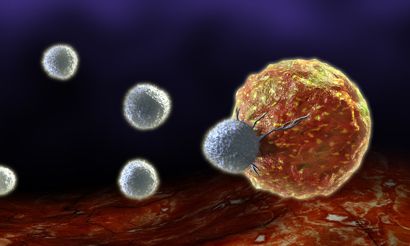Novel Bispecific Immunotherapy Yields Responses in Melanoma
IMCgp100, an anti-CD3 antibody fragment fused to a gp100-specific T cell receptor, yielded long-lasting responses in patients with advanced melanoma.
Mark R. Middleton, MD, PhD, a professor of experimental cancer medicine at the University of Oxford in the United Kingdom

Mark R. Middleton, MD, PhD
IMCgp100, an anti-CD3 antibody fragment fused to a gp100-specific T cell receptor, yielded long-lasting responses in patients with advanced melanoma. These results, from a 17-patient expansion cohort, were presented at the 2015 AACR Annual Meeting.
Of the patients enrolled in the expansion cohort, 2 had advanced ocular melanoma and 15 had advanced cutaneous melanoma. The ongoing objective response rate in patients treated with IMCgp100 was 24%, with a complete response (CR) rate of 6% and a partial response rate (PR) of 18%. At the analysis, 2 patients continued to experience a PR for more than 18 months. Sites of response included the lungs, liver, lymphatic system, and soft tissues.
“Among these patients, we observed lasting tumor responses for both cutaneous and ocular melanoma,” lead author Mark R. Middleton, MD, PhD, a professor of experimental cancer medicine at the University of Oxford in the United Kingdom, said in a statement. “Importantly, responses were even observed in patients with advanced melanoma that was resistant to the immune checkpoint inhibitors that have recently become standard of care in many locations.”
All patients with ocular melanoma responded, with one CR that lasted over 4 months and 1 long-term PR. However, the ocular melanoma data were not yet fully mature, according to Middleton.
“It is too early to say if IMCgp100 is particularly effective in ocular melanoma, although the results are encouraging,” Middleton said. “These observations will be investigated further, both clinically and experimentally.”
The immunotherapy IMCgp100 is composed of an enhanced T cell receptor (TCR) fused to an anti-CD3 antibody single-chain variable fragment. The TCR is specific to gp100, an antigen that presents in the context of the major histocompatibility complex HLA-A2 on the surface of melanoma cells. When fused to the antigen, the antibody fragment recruits and activates T cells through.
“The targeting end attaches to melanoma cells and the effector end locks on to any neighboring killer T cell, resulting in directed destruction of the tumor,” Middleton said. “One can think of IMCgp100 as a molecular bridge connecting melanoma cells with killer T cells, encouraging the killer T cells to destroy the melanoma cells.”
T cell (grey) killing a tumor cell (yellow); courtesy of Immunocore Ltd

T cell (grey) killing a tumor cell (yellow); courtesy of Immunocore Ltd
In the dose escalation analysis, patients with HLA-A2-positive, stage IV or unresectable stage III melanoma were enrolled. In total, all but one patient had stage IV disease and 63% of patients received at least 2 prior systemic therapies, including ipilimumab (56%), a BRAF inhibitor (31%), or an anti-PD-1 or other immunotherapy (13%).
The most commonly reported adverse events were transient grade 3 pruritic rash and grade 2 pyrexia/edema, which were consistent with the phase I portion of the trial.
In the phase I portion of the study, 31 patients with stage IV or stage III unresectable melanoma who tested positive for HLA-A2 were divided into 8 cohorts to receive IMCgp100. Following the initial dose, patients were followed for 30 days. Patients who tolerated the first dose received weekly doses of IMCgp100 for 6 cycles. Doses were escalated until criteria for MTD were reached.
Four patients achieve a PR by investigator assessment: 1 was observed following the first dose and 2 continued for more than 9 months of treatment. Additionally, 1 patient experienced stable disease for more than 10 months.
The maximum tolerated dose was determined to be 600ng/kg or an absolute dose of 50mcg. IMCgp100 is administered on days 1 to 4 and 22 to 25 of a 6-week treatment cycle. Patients will continue to be enrolled in the study at 50mcg weekly for 8 weeks (NCT01211262).
“We look forward to continuing to follow all the patients who remain on the trial and to enrolling more patients to firmly establish the utility of IMCgp100 as a treatment for advanced melanoma,” Middleton said.
Middleton MR, Corrie P, Sznol M, et al. A phase I/IIa study of IMCgp100: Partial and complete durable responses with a novel first-in-class immunotherapy for advanced melanoma. Presented at: 2015 AACR Annual Meeting; April 18-22, 2015; Philadelphia, PA. Abstract CT106.
<<<
PTCy Offers New Hope for Mismatched Stem Cell Transplants in Leukemia, MDS
April 13th 2024Jeff Auletta, MD, discussed how PTCy-based graft-vs-host disease prophylaxis offers a promising approach for expanding access to successful cell transplantation regardless of donor match or patient ethnicity.
Read More